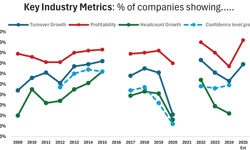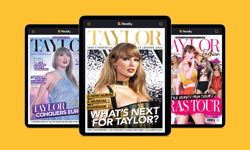
It sometimes feels like we’re living on the set of some spooky, dystopian science fiction film. There is a Terminator-style narrative that pits plucky humans fighting off the ruthless robots that we ourselves created. Having been our servants, now they are coming to get us.
Yet our latest mediashapers survey — an annual poll of people working inside the media business — shows a much more complex picture. The survey focuses on the people behind the headlines: the key individuals who are shaping the world of media.
This year, the survey respondents seem polarised between...
- Those who feel that there are no longer people at the helm of the industry — just faceless, impersonal forces and software platforms that are taking over and...
- Those who think that there are still individual human beings who are driving the changes and controlling the robots.
This polarisation is also reflected in the views of the impact of AI in their own business. Some see it as an incredibly useful tool; others as an existential threat; with many thinking that it is actually both at the same time. Yet more of that later.
Let’s dig into the detail of mediashapers. For starters, we asked our media-insiders, ‘Which individual do you think is currently having the biggest impact on the shape of the media business — for good or ill.’
Here is my summary of the results, along with comments from survey respondents.
Two names stand out, as they did last year — Sam Altman and Elon Musk.
Big Tech dominates
Sam Altman (OpenAI) was one of last year’s leading mediashapers. He remains a key figure this year, but the AI world is fragmenting around him. There is more software available and more publisher deals on offer.
- “So many groups are either testing ChatGPT or trying to do deals with OpenAI. Yet do they really understand who they’re getting into bed with? And is Altman still in control anyway? Have the robots already taken over?”
- “There are so many automation and AI tools coming on to the market, on a monthly basis. That is both liberating and confusing.”
- “I think AI remains the key issue for the media industry in 2024. The issues from 2023 have not been fully resolved, but we are a step further on now, as publishers look to do deals with companies like ChatGPT, Google, Microsoft and Apple. The aim is, hopefully, that we make some money from all this and do not get railroaded. Yet are these deals just short-term opportunism that will turn out to have been suicidal?”
Elon Musk (Twitter-X) still remains in the news for all kinds of reasons, such as offering to father children for Taylor Swift or interviewing Donald Trump in an interview, which one respondent described as “vile, mutual ego-massaging”. Yet for all his madness, Musk is still a force to be watched...
- “Unpredictable, dangerous, but ultimately self-destructive.”
- “The madman who constantly surprises everyone. And probably himself!”
Yet there is also a media-insider dilemma... “I don’t want to continue using Twitter-X, but it’s still a key comms channel for people working in media.”
Mark Zuckerberg (Meta) is not quite as prominent this year in terms of number of mentions, but attitudes about him have hardened. Last time, he was described as “clueless and conscience-free”. This year...
- “Zuckerberg is showing himself to be ruthlessly focused on revenue and Meta’s own interests, where publisher content has no social value, but is just a commodity to switch on or off. Or simply to be stolen.”
- “He is gatekeeping news and community engagement to the detriment of communities, newsrooms and local businesses.”
Behind these big three tech-leaders are Zang Yiming and Shou Li Chew, the TikTok founders, who make the poll for the first time, as the influence of the video platform grows. Then names such as Larry Page, Sergei Brin, Sundar Pichel and Satya Nadella feature — all part of the Big Tech Pack, although some have moved on from their original founding executive roles.
Where have all the media leaders gone?
The sense of there being fewer, strong media professionals leading the industry has been growing year by year in mediashapers.
Rupert Murdoch had been gradually receding into the background in recent surveys, seemingly losing power and relevance, until his fifth marriage thrust him back into the public glare. And then there’s the court case...
- “Just when we all thought that Murdoch was — almost literally — dead, along comes the court case around future control of News Corp after his death. The media mogul lives on! And media empires still operate and have influence.”
- “I cannot abide the man — what he stands for and how he does things. Yet at least he’s not a robot! Humans are not dead yet!”
The rest of the media leaders seem very low-profile, niche and specialist in comparison — a reflection of the fragmentation of the world of media itself and also of a more collaborative and democratic approach to management and leadership:
- Meredith Levien (New York Times): “She heads a company that is making enviable progress in its market, with smart content creation, packaging & distribution, but is also bold enough to challenge the tech giant Microsoft / OpenAI over the scraping of its copyright material.”
- Joshi Herriman (The Mill): “I’ve long felt that journalists at most levels either struggle to, or are reluctant to, promote themselves properly. Joshi promotes the work that the Mill does and that, more than the journalism itself, has generated extraordinary amounts of goodwill that rarely exists in the industry.”
- Ashley Tabor King (Global Radio): “Standing up against the power of Big Tech.”
- Nick Wallis (the journalist behind the Great Post Office Scandal): “An example of good, old-fashioned, doggedly persistent investigative journalism.”
- Lisa Smosarski (Stylist): “As an editor she has been a key figure in changing the media landscape for women’s lifestyle titles and is not afraid to publish hard-hitting pieces or ask those difficult questions.”
- Saj Merali (PPA): “Saj is driving forward positive changes in the magazine industry with a clear strategic vision and a genuine desire to create the best business environment for specialist media businesses.” The mentions of Merali highlight the potential for trade bodies to be the hub for collaborative publisher action in the face of Big Tech.
The growing political dimension
If media-insiders are losing influence and profile, then politicians are felt to be increasingly shaping the world of media. They are adept users of media themselves — here Putin and Trump dominate the poll — or they are intervening in the media business, by leading the regulatory charge to control the power and operating practices of Big Tech.
Vladimir Putin tops the poll in the area of political media manipulators: “Putin has effectively killed independent media in his own country and is seeking to manipulate it elsewhere.”
Donald Trump still holds a horrible fascination for media-insiders and is seen as being at the intersection between politics and entertainment.
- “Trump is the monster we in media have created. We have to take some responsibility for giving him a platform for his vile madness.”
- “He has a very selective approach to freedom of expression and the rule of law.”
- “He’s totally loathsome and a politically immoral narcissist. He’s also a criminal. But he’s a creation of television and he tells the people what they want to hear. Whatever happens, it will be a wake-up call for the Western world to start to realise that new laws are needed to control the pernicious grip that TV and online channels have on the public. We laugh at Donald Trump, but he is a warning to all of us.”
- “I once knew Trump well personally, but have long argued that he is totally unfit to be President of the USA. If he regains the White House, there will be dire consequences for Europe and Western democracy.”
Nigel Farage gets quite a few mentions...
- “That grinning ape... but he’s only a mini-Trump played in a lower key.”
- “I don’t agree with him at all, but his impact on the UK political landscape post General Election can only increase.”
More surprisingly, Margrethe Vestager and Thierry Breton (key figures in the EU Digital Media Act) show the growing importance of more faceless politicians and regulators in controlling the dark forces of Big Tech. Or is that just hopeless optimism?...
- “Some kind of control of Big Tech is required. Yet bad regulation will be worse than no regulation. As an industry, we need to get more involved in the detail of how this is all going to work in practice in the real world.”
- “My fear is that we’re just being naïve in thinking that regulation can slow the speed of Big Tech. Yet it’s our only chance to bottle the genie.”
The influence of influencers
One respondent captured the ongoing trend: “GenZ has moved away from ‘media companies’ to ‘news personalities’ who present, analyse and interpret, but in short-form formats, such as TikTok, Instagram Reels, YouTube. We are still trying to find our purpose and direction in this new media world.”
Picking out which influencers are the most influential is very much a matter of personal choice. There is a long list of people mentioned, including Jordan Peterson, Joe Rogan and Mayhar Tousi (“with his own YouTube news channel, he’s fearlessly covering the stories that other people won’t touch”). In addition, specific industries or lifestyle verticals have their own big-name influencers (eg. the evergreen Monty Don in gardening). These figures are often journalists who have broken free from the media company structures that gave them their initial platform (“I hate Jeremy Clarkson, but you have to give him credit for being irritatingly smart.”)
Yet it is two very different influencers who dominate the poll in terms of the number of votes: Taylor Swift and Gary Lineker.
Taylor Swift...
- “An entertainer who uses her influence in politics. And 280m followers is what I call ‘influence’ at scale!”
- “She made a last-minute intervention back in 2020, backing Biden & Harris. Now she’s done it again in 2024. The ‘childless cat lady’ bites back!”
- “She’s not going to change the course of the election, but she might drive first-time voters to register and swing a few floating voters over to the Democrats.”
- “I just don’t get why she has such a large and passionate following of Swifties. And I find that level of influence quite scary, even when it is used for good.”
There were many comments about Swift’s choice of social platform, trying to move away from Twitter-X (although ironically that is where she chose to engage with Musk in the “cat lady” exchange) on to Instagram.
Gary Lineker is a big name... again! Last year, it was all about his spat with the BBC about openly revealing his own political beliefs. This year, there is much more focus on the Goalhanger podcast production company he co-founded:
- “Goalhanger is only two years old, but it’s now the largest indie producer of podcasts in the UK and is extending into video, live events & roadshows. And they’re even talking about magazines. Lineker is morphing backwards, from being an influencer into becoming a traditional publisher.”
- “Goalhanger shows that you can reach a younger audience with long-form content. That’s a relief!”
The humans are not dead yet
This year’s mediashapers survey is a real mix of the old and the new. On one hand, the well-established names and issues are still there. That includes the retreat of the traditional ‘media mogul’ and ‘media empire’; the lack of obvious media industry leaders; the growing role of influencers; the increasing importance of politicians and the political regulation of media.
Yet there is a real change of mood. Firstly, there is a growing sense that we media-insiders have been complicit in creating our current media world, whether that is helping to create media monsters like Trump, or accepting technology that could destroy ‘media’ as we know it — or at least redefine it beyond recognition.
Secondly, there is clearly a massive amount of human creativity on display. Yet this is increasingly in smaller companies rather than the large media conglomerates. And in B2B and specialist consumer verticals, rather than in ‘news’, important though this still is.
Thirdly, the robots are on the march. It may not be a Terminator-style war, of pitting humans against robots, or of good fighting evil. Yet there is something massive and unpredictable going on: a real sense of this being a pivotal, transitional and transformative moment in the development of media. We shall explore that in more detail in the next mediashapers piece, where we zoom in in the media companies and brands who are making an impact in media world.
Yet, as with the Terminator franchise itself, there are lots of sequels on the way. This one is going to run and run. And between them, Murdoch, Musk and Trump would keep any robot guessing what we silly humans might do next.
Click here to listen to a podcast about the whole mediashapers 2024 poll.
This year, mediashapers also looks at the hot companies and brands that are having an impact on the media business. Click here to read.












